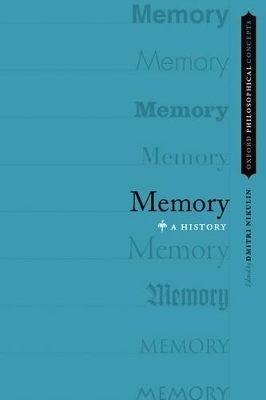
Memory
Oxford University Press Inc (Verlag)
978-0-19-979384-6 (ISBN)
In recent decades, memory has become one of the major concepts and a dominant topic in philosophy, sociology, politics, history, science, cultural studies, literary theory, and the discussions of trauma and the Holocaust. In contemporary debates, the concept of memory is often used rather broadly and thus not always unambiguously. For this reason, the clarification of the range of the historical meaning of the concept of memory is a very important and urgent task. This volume shows how the concept of memory has been used and appropriated in different historical circumstances and how it has changed throughout the history of philosophy. In ancient philosophy, memory was considered a repository of sensible and mental impressions and was complemented by recollection-the process of recovering the content of past thoughts and perceptions. Such an understanding of memory led to the development both of mnemotechnics and the attempts to locate memory within the structure of cognitive faculties. In contemporary philosophical and historical debates, memory frequently substitutes for reason by becoming a predominant capacity to which one refers when one wants to explain not only the personal identity but also a historical, political, or social phenomenon. In contemporary interpretation, it is memory, and not reason, that acts in and through human actions and history, which is a critical reaction to the overly rationalized and simplified concept of reason in the Enlightenment. Moreover, in modernity memory has taken on one of the most distinctive features of reason: it is thought of as capable not only of recollecting past events and meanings, but also itself. In this respect, the volume can be also taken as a reflective philosophical attempt by memory to recall itself, its functioning and transformations throughout its own history.
Dmitri Nikulin is Professor of Philosophy at the New School for Social Research in New York. His interests range from ancient philosophy and early modern science to the philosophy of dialogue and philosophy of history.
Contents ; Introduction. Memory in Recollection of Itself. Dmitri Nikulin ; Ch.1. Memory in Ancient Philosophy. Dmitri Nikulin ; Reflection: Roman Art and the Visual Memory of Greece. Francesco de Angelis ; Ch.2. Memory in Medieval Philosophy. Jorn Muller ; Reflection: Visual Memory and a Drawing by Villard de Honnecourt. Ludovico Geymonat ; Ch. 3. Memory in the Renaissance and Early Modern Period. Stephen Clucas ; Reflection: Memory and Forgetfulness in Daoism. Xia Chen ; Ch. 4. Forms of Memory in Classical German Philosophy. Angelica Nuzzo ; Reflection: Memory and Story-Telling in Proust. Mieke Bal ; Ch. 5. Memory in Continental Philosophy: Metaphor, Concept, Thinking. Nicolas de Warren ; Reflection: Freud and Memory. Eli Zaretsky ; Ch. 6. Trauma, Memory, Holocaust. Michael Rothberg ; Reflection: Memory: An Adaptive Constructive Process. Daniel Schacter ; Ch. 7. Memory in Analytic Philosophy. Sven Bernecker ; Reflection: The Recognitional Structure of Collective Memory. Axel Honneth ; Ch. 8. Memory and Culture. Jan Assmann
| Erscheint lt. Verlag | 8.10.2015 |
|---|---|
| Reihe/Serie | Oxford Philosophical Concepts |
| Verlagsort | New York |
| Sprache | englisch |
| Maße | 257 x 140 mm |
| Gewicht | 462 g |
| Themenwelt | Geisteswissenschaften ► Philosophie ► Erkenntnistheorie / Wissenschaftstheorie |
| Geisteswissenschaften ► Philosophie ► Geschichte der Philosophie | |
| Geisteswissenschaften ► Philosophie ► Metaphysik / Ontologie | |
| Geisteswissenschaften ► Psychologie ► Biopsychologie / Neurowissenschaften | |
| Geisteswissenschaften ► Psychologie ► Verhaltenstherapie | |
| Geisteswissenschaften ► Sprach- / Literaturwissenschaft ► Anglistik / Amerikanistik | |
| ISBN-10 | 0-19-979384-0 / 0199793840 |
| ISBN-13 | 978-0-19-979384-6 / 9780199793846 |
| Zustand | Neuware |
| Haben Sie eine Frage zum Produkt? |
aus dem Bereich


![Was heißt Denken?. Vorlesung Wintersemester 1951/52. [Was bedeutet das alles?] - Martin Heidegger](/media/113619842)